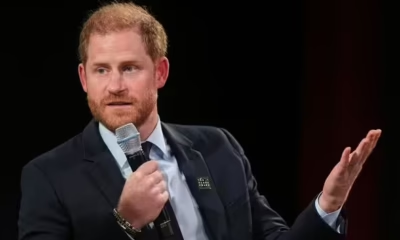CELEBRITY
The Hoax Call with ‘Greta Thunberg’ and Prince Harry: A Deceptive Encounter that Sparked Controversy

The Hoax Call with ‘Greta Thunberg’ and Prince Harry: A Deceptive Encounter that Sparked Controversy
In a world where digital technology increasingly blurs the lines between reality and fiction, the recent hoax call involving a fake Greta Thunberg and Prince Harry stands as a stark reminder of the vulnerability of even the most high-profile figures to deception. This encounter, orchestrated by Russian pranksters, not only raised questions about security protocols but also reignited debates on media manipulation, celebrity culture, and political agendas.
The Setup: A Call that Shouldn’t Have Happened
The phone call, which took place in December 2022, involved Prince Harry, the Duke of Sussex, who believed he was speaking with climate activist Greta Thunberg. Unbeknownst to him, the voice on the other end of the line belonged not to the Swedish teenager but to two Russian pranksters, known for their infamous hoax calls to various public figures.
The pranksters, who go by the names “Vovan” and “Lexus,” have a history of successfully impersonating high-profile personalities, often targeting political figures, celebrities, and members of royal families. In this case, they had set their sights on Prince Harry, who has become an outspoken advocate for climate change action and social justice, particularly following his departure from royal duties.
The duo managed to convince Harry that he was speaking with Thunberg, whose environmental activism and advocacy for sustainable living have made her a global icon. This phone call, lasting several minutes, involved discussions on environmental issues, political topics, and personal views. However, what seemed to be a routine conversation was anything but.
The Contents of the Call: Revealing Private Conversations
During the hoax call, Prince Harry, perhaps not suspecting the authenticity of the caller, shared personal and sensitive opinions on various topics. One of the most notable moments was when Harry discussed his views on global politics and the actions of various world leaders, including his stance on climate change and how governments are responding—or failing to respond—to environmental challenges.
The pranksters also pushed Harry to express opinions about the media, his family, and even his own controversial exit from the royal family. These private revelations, some of which appeared critical of his family members, were quickly shared on social media, causing a stir in the public eye. The pranksters also managed to lead the conversation toward the topic of Prince Harry’s relationship with the British royal family, pressing him on sensitive matters that would likely have been discussed behind closed doors.
For Harry, the realization that he had been duped came too late, as parts of the conversation were already being disseminated to the public, causing confusion and embarrassment. The fallout from this incident was immediate, with many questioning not only the Duke’s security but also his apparent ease in discussing private matters with someone he believed to be a trusted ally.
The Aftermath: Reactions and Controversies
The prank call quickly became a major talking point across the globe, generating widespread media coverage and sparking debates about the personal security of celebrities and public figures. Some saw the prank as a harmless joke, a moment of comedic levity in an otherwise tense world of politics and media. However, for others, it raised serious concerns about privacy, trust, and the ethical boundaries of pranksterism.
One of the main criticisms came from those who felt the incident exploited Prince Harry’s personal struggles and complicated relationship with the British royal family. As someone who has been publicly vocal about the intense media scrutiny and lack of privacy he experiences, the hoax call only served to underscore the vulnerability of public figures in the age of digital media.
The Royal Family, for its part, remained relatively silent in the aftermath, with a spokesperson for Prince Harry acknowledging that he had been misled by the pranksters. However, the incident only fueled further speculation about the Prince’s relationship with his family, especially given the sensitive nature of the conversation.
The Role of Digital Deception in Modern Society
The hoax call highlights a growing issue in the age of digital communication: the ease with which individuals can be deceived into revealing personal information or engaging in conversations that would otherwise be considered private. With the advent of deepfake technology and increasingly sophisticated impersonation tactics, even the most cautious public figures are not immune to manipulation.
In addition to raising questions about security and privacy, the incident also brought attention to the role of the media in shaping public perceptions of individuals. The fact that the prank was immediately broadcasted and shared widely across social media platforms further underscores the power that online spaces have in amplifying the impact of such pranks, often leading to long-lasting consequences for those involved.
Moreover, the incident served as a stark reminder of the complexities of celebrity culture. Public figures like Prince Harry, who are constantly in the media spotlight, are often seen as fair game for pranks and satire. However, this hoax also revealed the emotional and psychological toll that such constant scrutiny can take on individuals, even those who appear confident and outspoken.
Conclusion: A Lesson in Vulnerability and Responsibility
In the end, the hoax call with ‘Greta Thunberg’ and Prince Harry offers a cautionary tale about the perils of digital deception. While the prank may have provided some amusement for those on the outside looking in, the incident exposed the deep vulnerabilities of public figures in an era where privacy is increasingly difficult to maintain.
The controversy surrounding the hoax call serves as a reminder that, even in a world dominated by technology and media, the boundaries of trust, privacy, and respect should remain paramount. It’s a lesson not only for public figures but for all of us, as we navigate an increasingly interconnected and unpredictable digital landscape.












